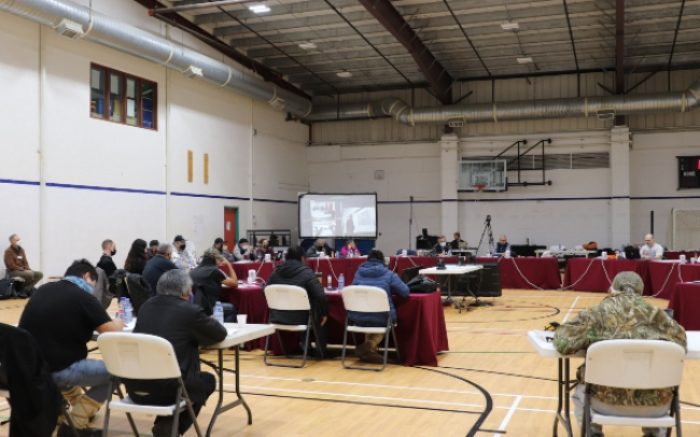Dehcho First Nations (DFN) members met in Łı́ı́dlı̨ı̨ Kų́ę́ (Fort Simpson) Dec. 15-17 for the Dehcho K’éhodi Regional Gathering.
‘Dehcho K’éhodi’ means ‘Taking care of the land’ in Dene Zhatie. The gathering is aimed at elders and youth, with delegates from every community attending the gathering.
Many topics were discussed throughout the gathering: regional land-based programming update, health and wellness update, community updates and breakout sessions regarding climate change to name a few.
The changing of an engagement policy
Jessica Jumbo, delegate from Sambaa K’e (Trout Lake), talked about changing the engagement policy with outsiders in their community.
“The way we see it is if we change that engagement policy, it would have to force companies to change their insurance policies,” says Jumbo.
“Because right now, when a company comes into the community to work, I always say, ‘Can we take a student? Or can you guys take on a guardian that goes with you on our traditional territory’, so at the same time, they’re being able to monitor but not only that, they’re also assisting them… traditionally, or environmentally assisting them,” says Jumbo. “But a lot of them say, ‘Oh, we can’t take them along, because of our company’s insurance policies only cover their employees’.”
Jumbo added how community members, especially Elders, aren’t comfortable with outsiders coming into the community without notice. She gave the example of helicopters that would fly in and around the community without knowing what is happening.
“It’s their traditional territory, and they lived off the land… So to me, they have every right to feel concerned about what’s going on out there,” says Jumbo.
The engagement policy would also benefit smaller communities. Sambaa K’e is the smallest community in the Dehcho region with around 80 people, making it difficult to get funding for programs and having enough people to carry them out.
“If I got companies to change their engagement plans… which forced them to change some of their policies, then our guardians would be able to assist them or shadow them or supervise them on our traditional lands without it having to come out of our costs, just their wages,” says Jumbo. “They would be tacked on with the company that’s already travelling up there. So I saw it as tackling multiple different issues that a small community deals with.”
Jumbo hopes that on projects with outside companies in the future, they have a ‘With the Land’ camp to show the visitors why they have to respect the land, the community and the people.
On estimating how long it’ll take, Jumbo says ‘it would take a couple of years’.





